The National Association of Evangelicals has launched a new resource to help Christians assess where they stand on racial justice and then take appropriate next steps to further race relations.
The online “Racial Justice Assessment tool,” posted on the organization’s website Monday, is designed to provide users with suggestions of books, videos, articles and online courses to consider based on their answers to a brief survey about racism and equality.
Recommendations include books by best-selling Christian authors Jemar Tisby and Tim Keller, the writings of Ta-Nehisi Coates and the Rev. Martin Luther King Jr., a video on race in the U.S. by VeggieTales creator Phil Vischer, and a New York Times video series on conversations about race with people of different racial and ethnic groups.
“We at the NAE have developed this tool to help you explore opportunities for growth and to engage in topics that might challenge, encourage and inspire you,” said NAE President Walter Kim in a brief video message that welcomes viewers to the three-minute assessment. “The Bible teaches the essential dignity of all humans and our shared desire to live in community. Yet the reality of sin results in the denigration, alienation and injustice that we see before us.”
The NAE hired Mekdes Haddis last year as project director of its new Racial Justice and Reconciliation Collaborative.
Your tax-deductible gift helps our journalists report the truth and hold Christian leaders and organizations accountable. Give a gift of $30 or more to The Roys Report this month, and you will receive a copy of “Hurt and Healed by the Church” by Ryan George. To donate, click here.
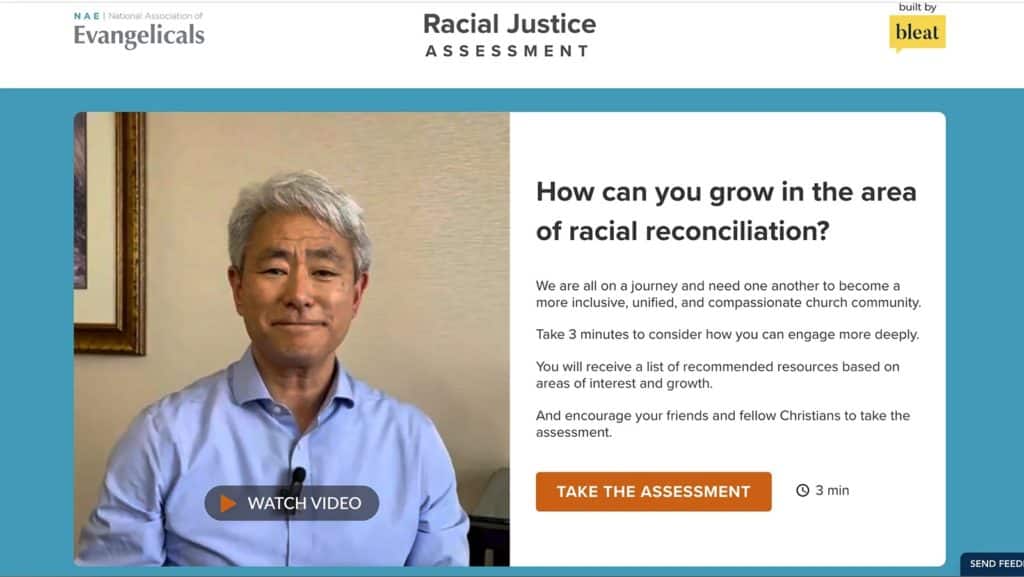
She said she has spent months meeting with representatives of some of the dozens of NAE member denominations and other partners to learn what would be most helpful. Some said they wanted to “help people realize that they lack an understanding” of race-related matters or hoped participants would be convinced to get more engaged on topics of racial justice.
“We didn’t really want to recreate the wheel,” said Haddis, in an interview ahead of Monday’s launch. “We wanted to bridge a gap that was existing.”

She said the tool is designed for people who’ve already read a book or watched a webinar and want to move on to next steps but also for those who haven’t taken any steps as of yet.
“Whether you’re curious and kind of unengaged or suspicious or whether you’re very excitingly pursuing justice,” she said, “for everybody, we’re recommending a step forward.”
Recent research has shown gaps between how different religious groups view racial matters, including when they are asked which is the bigger problem in the U.S.: people overlooking racism when it exists or seeing racism where none exists. Majorities of white evangelicals (72%), as well as white Catholics (60%) and white mainline Protestants (54%), told Pew Research Center that claims about racism where there is none was the bigger issue. Far fewer Black Protestants (10%), non-Christian religious Americans (31%) and unaffiliated Americans (35%) agreed.
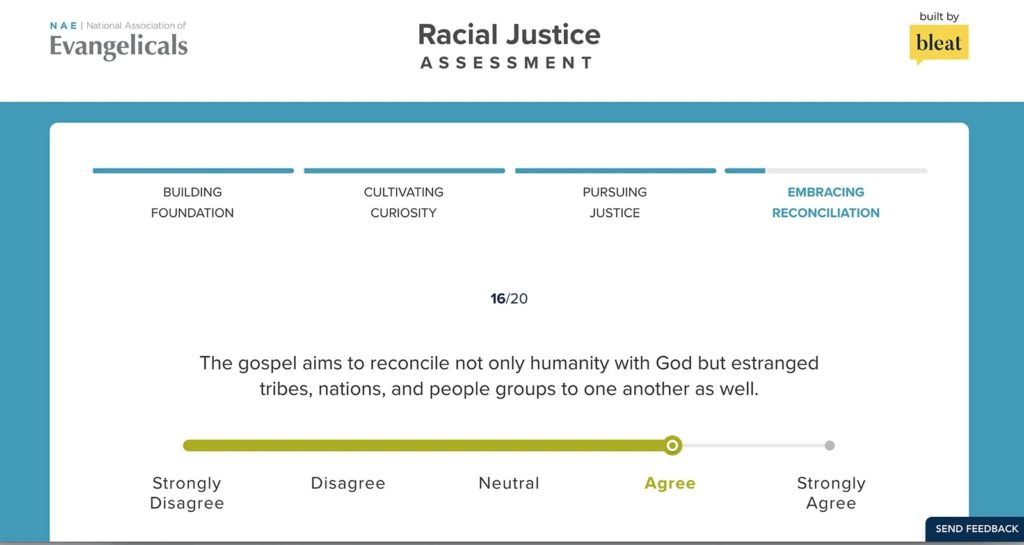
Haddis, who is an Ethiopian American, said she hopes the assessment and the recommended resources will give participants a sense of what is being said inside and beyond church circles about these issues.
“We felt like it was important to engage in what’s happening outside of our Christian bubble,” she said.
The collaborative hopes to continue to expand its offerings, including a fall retreat for Black and Indigenous people of color that aims to provide “spiritual encouragement” for evangelical leaders who work on racial justice and reconciliation, lead predominantly white organizations or are involved in starting multiethnic churches.
 Adelle Banks is production editor and a national correspondent at Religion News Service.
Adelle Banks is production editor and a national correspondent at Religion News Service.




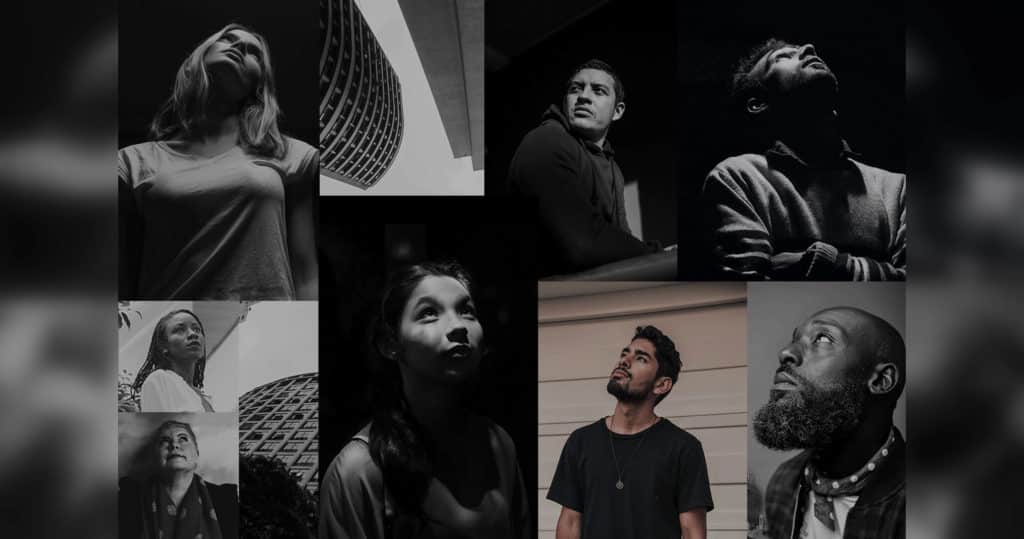

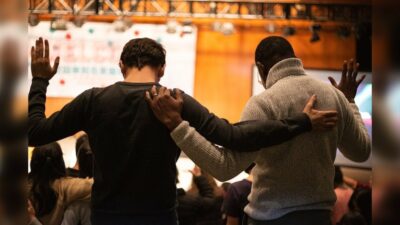
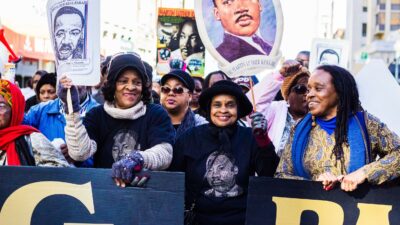

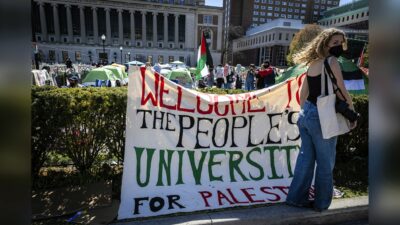










54 Responses
Jopefully every church affiliated with the NAE will encourage ALL congregants to use this resource.
The GOSPEL, people. Anything that points you away from Christ’s redeeming power is a tool of Satan himself. Be careful not to substitute the Bible for any man-made “Racial Justice Assessment” tool. Sin is Sin is Sin. It is not only about racism – it is about lying, cheating, stealing, etc.
Indeed, in recent days it has become apparent that even Ibram X. Kendi, who purports to hold the key to racial justice and reconciliation, is a sinner. Absent God, he has become a voice for all things antithetical to Biblical truth.
BEWARE, fellow believers. When Jesus saved us from sin, it was enough. His sacrifice is enough. His blood is enough. His healing power is enough. His love is enough.
Do not be taken in by the guilt trap of those who seek to add to or take away from the Gospel. Do not be fooled by those who claim you need to repent for the sins of those who went before. You are not responsible for the sins of the past.
Romans 8:1:
“Therefore, there is now no condemnation for those who are in Christ Jesus,”
But, you agree that racism is sinful? I am no theologian but, the Bible seems pretty clear on that. And it doesn’t mean racism is not a sin just because other sins exist.
Jane,
Of course racism is a sin! My point is, racism is not THE sin. It is only one of many.
If you’re not a racist and treat all equally then fine. However there are many in the church that do not.
George,
Yes, I imagine there are many people in the church who do not treat all equally. Isn’t it cool that Jesus set the example by treating all of us equally? I think it’s what made the leaders of his day angry – they didn’t like him mixing with “sinners,” not realizing that ALL of us are sinners. I think they felt superior to most, don’t you? And yet, here’s Jesus, the SON OF GOD himself, treating all of us the same. How marvelously wonderful is that?
Wake up Christians! This is nothing more than another attempt by the Marxists to infiltrate the church of Christ and infect it with their unholy doctrines! The big clue is the word “justice”! They are about lies, division, hate and anything BUT justice! Don’t be fooled by their lies! The only cure for racism is the life changing blood of Christ through Salvation! They do NOT believe in this! But instead preaching a false gospel of hate and division! Beware of them!
It’s sad when Christians view addressing and confronting racism as Marxist rather than our responsibility to love all as Christ did.
https://www.biblegateway.com/quicksearch/?quicksearch=Justice&version=NIV
Joyce,
I believe you are correct. This from the Washington Post, by Tyler Austin Harper:
“Unlike his earlier work, which framed anti-racist struggle as a matter of wonkish resistance to bad policies, “How to Be an Antiracist” started conceiving of anti-racism as a personal “journey” toward enlightenment. “Like fighting an addiction,” Kendi counsels, “being an antiracist requires persistent self-awareness, constant self-criticism, and regular self-examination.” He distilled these views to the slogan: “The heartbeat of racism is denial, the heartbeat of anti-racism is confession.”
Do other Believers see the problem here? Jesus’ sacrifice covers all sin.
Please stop with the Marxist accusations. This isn’t the 1950s.
Ibram Kendi is a sinner – just like we all are. Thank God for His son.
Racism is a sin as old as time. We see examples in scripture (e.g., Miriam disliking Moses’ wife, Jews vs Samaritans, etc). We are shown how seriously God takes it (e.g., Miriam’s punishment) and how to intentionally confront and handle it (e.g., Jesus’ living example, good Samaritan parable, Paul confronting Peter, all the disciples spreading the gospel among Jews and Gentiles alike).
Therefore, as disciples of Christ, we are to take racism seriously, stop minimizing or deflecting when it comes up (“well lying is a sin too”), and stop making excuses to avoid confronting and handling it (“I don’t like that author’s politics”). The church needs to stop tap dancing around this:
Racism is hurtful, destructive, continues to evolve and manifest in various ways and forms, and is an affront to the God who created us ALL in His image. And just as scripture warns us that sins have impacts that last for generations (we see several scriptures warning of sin impacting one’s children’s children), racism is no different. So yes, we are experiencing the impact of the sins of racism from generations past (and watching its evolution in the present), and if we do not address it, it will continue to impact OUR children’s children.
If knowing and quoting scriptures were enough, the church would be leading the way here. But unfortunately, we aren’t going far enough, and we are doing little more than reflecting the world. We need to LIVE the scriptures we are quick to quote.
Marin,
Thanks so much for your comments! I agree, we must take racism seriously. We must take lying seriously. We must take ALL SIN seriously.
It is not a deflection to state the truth.
The church of Christ does not tap dance around sin! If it did, it would find itself in the same position as many NT churches and would quickly become obsolete. Further, Jesus tells us to love our neighbor as ourselves. He never said we should love only those who look like us.
Your singling out of racism implies it is THE SIN. Indeed, canceling our culture and people from the past who held slaves does nothing to eradicate racism. Only God can do that. Yes, we need to live out the Bible every day. Only God can help us do that. I could read all the anti-racism books that exist in the world and not ONE of them would equal the power of God’s Word. Not one.
Here is one paragraph of an article on the topic that you might find helpful:
“We should not refuse to honor a godly leader from the past because of certain sins. The Buswell example is pertinent, as many institutions today, both Christian and non-Christian, have chosen the evil of racism as the one that cancels a person. We can be tempted to conflate the world’s priority with Christ’s call—ironically perpetuating the wrong of caving to the culture that contributed to racism in centuries past. Yes, the world is correct in its revulsion against racism, but human beings have a past (and a present) filled with all kinds of sin. Yet we have singled out this one as grounds for cancellation.” https://wng.org/opinions/dont-deny-our-fallenness-1695352701
Cynthia –
Racism is not THE sin, but it is the sin this article is talking about. So to start talking about lying or whatever under an article about addressing racism is deflection.
Pride is THE sin. All sin – even racism – is rooted in pride.
“The church of Christ does not tap dance around sin! If it did, it would find itself in the same position as many NT churches and would quickly become obsolete.”….it is becoming obsolete to many.
Cynthia,
Have you ever learned that the Christian church in America helped to institutionalize racism in America?
Our conservative Christianity condoned it. We gave cover to the slave owners, to segregation and Jim Crow. We preached against Brown vs Board of Education for two decades after it was decided and formed our own whites only schools in order to exclude blacks.
In the 1970s and the 1908s we were still arguing at the Supreme Court that were were entitled to discriminate against Blacks “because of our Christian beliefs.”
Have you read our history? If not, you should read those books the NAE recommends.
Hi Greg,
Thanks so much for your comments. Yes, I am well aware of the sordid history behind segregation in the USA. However, are YOU aware that Jesus forgives? That the past is the past? That laws in the USA no longer condone racism and segregation in our school systems? That the USA is the most diverse nation on earth? That the books the NAE recommends are not based on teachings found in the Bible?
Are you aware that many of the books you/NAE recommends reading are instead based on Liberation Theology, which does not need Jesus?
Sorry, Greg. I need Jesus and his forgiveness for my sins. Those who don’t do not adhere to Christian teachings and, I would have to say, are not actually part of Christ’s church.
Only Christ can change the heart of Man. Only God can change our past into something better.
Knowing our history cannot change our hearts, Greg. I could read all the anti-racist books you recommend and finish by hating even more. I believe that may be what is happening in our nation. “Anti-racism” has simply led to more hatred.
What disturbs me about C. Norbots response is that it’s too simplistic, If one were to take her approach literally the responses to life’s problem would be something like this……..
Parishioner. “I have a headache pastor what should I do?”
Pastor. “Believe the Gospel”
Parishioner. “the transmission on my car went out”
Pastor. “Believe the Gospel”
Parishioner. “I lost my job”
Pastor. “Believe the Gospel”
George,
Your comments made me smile. Thanks. Most people, I would imagine, go to the doctor when they have a headache, go to a car mechanic when their car is out, and go to the employment agency when they lose a job.
So then what is the issue with seeking out experts (in history, theology, sociology, cultural anthropology, and psychology) when the church has a clear problem with racism?
Yep, there are a ton of those folks in the church. If a pat answer can’t fix it well, then, it must not be a problem. Life is a lot more nuanced than that.
Jane,
Yes, Jane, life is incredibly nuanced. It’s why you won’t get far without Jesus.
Cynthia –
You quoted “Like fighting an addiction,” Kendi counsels, “being an antiracist requires persistent self-awareness, constant self-criticism, and regular self-examination.”
Food for thought: is this all that different from having the Spirit constantly expose where and how we fall short of God’s standard (sin), so we can repent of it and grow more and more in His image? Repentance isn’t a one time thing; it’s the lifestyle of a disciple. The more we walk with God, the more we see our own sin and lay it at the foot of the cross. Keep repenting and turning to the cross.
Isn’t that similar to constantly being self aware of how we could be upholding racism (intentionally or not)?
Marin,
Your words:
“Food for thought: Is this all that different from having the Spirit constantly expose where and how we fall short of God’s standard (sin), so we can repent of it and grow more and more in His image?”
Yes, it’s 100% different. One relies on God, the other relies on personal effort. One relies on God’s spirit to reveal where we fall short, the other relies on human attempts to become perfect. Human efforts ALWAYS end in failure: It’s why Jesus came.
Thanks for your question, Marin. You have made clear the difference between being a Christian and being a non-Christian.
Yes, both rely on different things, but it’s the same concept. THAT is my point.
Both require constant self-reflection to identify our shortcomings and how we need to grow. And based on many of the comments I’m reading, and overall condition of the church on matters like this, a lot of Christians can use some self-reflection.
A quick look at the recommended resources they give shows these to be lacking in conservative perspectives. The assessment itself, like most such tools, seems to be vague and the questions not well worded, but also slanted to give the result they desire.
For example, the recent book by philosophy professor Douglas Groothuis of Denver seminary, Fire in the Streets is missing.
Julie Roys, I request again that you interview, in writing or in podcast, Dr. Groothuis.
But is racism about politics? Or about humanity?
Fire in the Streets is about CRT, and given that CRT is a theory (it’s actually called a theory), there is room for (welcome) debate on all sides.
But not all discussions about racism are CRT. And racism is not a theory. It is a sin to be confronted.
A good example of Dr. Groothuis’s writing on CRT is here: https://www.douglasgroothuis.com/post/strong-what-is-critical-race-theory-strong
A sample about CRT and racism: “ CRT claims that America is systemically racist and that the entire social system disadvantages POC—a term which includes all non-white people, but which usually refers to African Americans. Any discrepancy in the achievements between POC and white people is due primarily, or entirely, to this systemic racism. The claim of systemic racism is often accompanied by the idea that America has been racist from its beginning. The 1619 Project, a long-form journalism project of the New York Times that aims to reframe national history, claims that America was founded on racism when the first slaves were brought here in 1619. Any idea of “American exceptionalism” is therefore deemed racist, xenophobic, and so on.”
Robert –
Yes and this is a theory that can be debated.
But again, not all talk of racism is about CRT. We have started conflating the two.
Here is why we need conservative viewpoints on this issue –When things are called racist that are not, it’s going to be hard to have a neutral, non-political, unbiased discussion about racism. When Dems don’t want to require ID for people to vote because if we require ID then minorities will be disadvantaged and that is racist. Minorities don’t have IDs? I suppose it’s also racist for airlines to require ID to fly?
Scott –
Lots to say here, but I’ll start with this:
The reason why requiring ID to vote is a controversial is because government IDs aren’t free. It’s requiring something that cost money to do something that is our free constitutional right. That’s the equivalent of requiring a poll tax. Poll taxes are against the constitution (they have been tried before to prevent poor people and minorities from voting).
Democrats have consistently said “if states issued a free ID, then yes, it should be required to vote.”
My state does issue a free ID – but you have to go to the DMV, which is a 30-mile drive, during open hours (when many people are working), with your birth certificate or whatever (which some people don’t have access to). So, it’s possible to get one free if you have transportation, documentation, and a job that lets you have time off. Still a lot of barriers for folks in my area. I keep meaning to suggest to my state representative that the DMV works with the school system to get the kids set up with a photo id.
It is very difficult to function in society without ID. However, instead of complaining about the barriers to obtaining ID, communities need to develop proactive strategies to combat the problem. For example, some cities have developed a city ID which can then be used to bridge the gap in obtaining state or federal records such as social security cards or birth certificates.
Agree. These solutions just need FUNDING. That’s when people start balking.
I’m sorry, but I tire of excuses. I live in California. The action of liberalism. I had to jump through hoops and stand in long lines 3 times just to get my “real id”. An ID is required for everything here. No reason I can’t be required for voting. In fact it was during the 70s and 80s.
And that commute can also be very inhibiting – costing significant time and money – for rural residents. Thank you for sharing, Elizabeth.
I also like the notion of having kids set up with an ID at school. Many schools already distribute a school ID; imagine having one for students who turn 18 that can be used to vote.
Joyce –
Make that ID free, and this whole argument would stop. No concerns about paying for something in order to do what is our free constitutional right. No indirect poll tax.
It isn’t just black people who are affected by voter id laws. Other core constituencies are disproportionately kept away from the polls. People who have already voted, people who do not exist, people who do not live in the electoral district, people who are in prison and the dead are all excluded from exercising the franchise. Allowing these people to vote doesn’t seem to be a problem worth either solving, to the extent that it occurs, or preventing, to the extent that it doesn’t.
Nobody who may be otherwise eligible to vote (and a lot of people who aren’t) seems to have any problem getting a government issued id when they want to apply for public assistance, and in any case, if the non-profit organizations and the churches wanted to help these people get government identification, they might do more good than they will by railing against legislative efforts to prevent a problem that they claim doesn’t exist, but that they tacitly believe would be hunky-dory if it ever happened.
Scott – I’d also like to ask who determined what is racist or not? Again, if anything – a person, attitude, action, policy or practice – treats people differently based on race – it is racism. It’s not always slurs or the “obvious”. It can be code language and policies….like giving preferred college/club admissions to legacies, knowing that your school/club JUST started admitting people of color within the last generation.
Marin,
One more quick thought here. What do you think the church should be doing differently when it comes to racism?
I won’t pretend to have THE answer. But here’s a start:
1. Study our history, where we as the church have gotten issues on race right and wrong – and WHY
2. Listen to the people of color in our congregations WITHOUT judgement or right fighting. Stop with the “but that’s not what happened”, “you got that wrong”, “it’s complicated” or whatever other defensive response that gaslights and justifies their experience that made them feel lesser or “othered”.
3. Don’t think you have all the answers. No, it’s not “because Black kids don’t have fathers.”
4. Develop deep relationships with people of other races. Over 70% of white people don’t have a close friend of another race. I wish I had data for others, but I’m willing to bet it’s pretty similar. We can’t talk to each other or “have all the answers” if we don’t KNOW each other.
5. Ask what people of color need. Don’t assume you know. Don’t think “look at what the Asians/Jews did!” will automatically apply to Black people. Let them tell you what they need. That requires relationship.
6. Stop making it about politics. Racism is a human issue, not a conservative or liberal issue.
7. Remember pride begets excuses and humility begets change. We all need to stop making excuses for why we are in this condition (churches and denominations being the most segregated, etc) and get before the cross to ask God what He wants us to change to bring about healing
THIS is what love in action looks like. Not just quoting scripture.
As for the issue of racism, it doesn’t just flow one way you know. I find that those pushing this issue of racial justice so hard are the most racist people towards just about everyone else. They are also very filled with hate. As I posted before, beware of damnable heresies entering the church. TRUE believer I’m Christ will eventually learn to love his neighbor as himself
In academic books, racism often refers to power structures, while behaviors are called “prejudiced” or “bigoted”. That is often why it can appear books are focused on racism going “one way”. Just a clarification on racism vs prejudice vs bigotry in academic circles.
But we won’t get anywhere if we respond to hearing about racism, prejudice or bigotry against ANY group with whataboutism.
How about we respond with empathy? We all know what it’s like to be “othered”. Why can’t we start there?
Marin,
Yes, everyone knows what it feels like to be “othered.” My personal beef is with those who make fun of or belittle people suffering from mental illness or physical/mental handicaps. For some reason, I go from 0 to 10 when I see someone in this group getting belittled. Often, I am very thankful I don’t have a weapon handy because the anger is so overwhelming I would likely do something rash if given the opportunity.
So, yes, I have a small understanding of what being “othered” entails.
Perhaps the problem here lies in the constant victimization mentality displayed so often by Black people. In spite of many perks thrown in their direction by guilt-ridden whites, many continue to complain. Is because outcomes are so unequal?
Cynthia –
If you know what being “othered” entails, why would you want that for ANYONE else? It’s telling you get angry when those suffering from mental illness are belittled, but you react to the “othering” of Black people with dismissive generalizations like “constant victim mentality.” You refer to people who attempt to bridge the gap as “guilt-ridden whites” giving us “perks”?
THAT is what makes me question if you like Black people. You say you “know people” who think we are subhuman. That STILL sits in my core. I bet you’re quiet when it’s said, too.
We are Black HUMAN BEINGS, created in His image. God has seen us through slavery, reconstruction, Jim Crow, wars and the like. I am of the first generation of Black Americans born with the right to vote. Yes, that means there are Black people living among us who fought wars for a country that did not allow them to vote. That’s not victimhood, that’s FACT.
Perhaps it’s your hatred that has you hearing our story as one of victimhood instead of survival by the hand of God. Black people are STILL here – many rising to the upper most ranks in our country – despite EVERY effort to “other” us. My family tells our story as a testimony to a God that has protected us for over 8 generations and counting! We are Black Americans who are faithful to God, country (Air Force family, all the way!), the church, and one another.
I pray one day you’ll find a way to respect that story – and Black people too – giving thanks to God for all He has done, instead of hearing it as “victimhood.”
Hello Marin,
Sadly too many who get a steady diet from the talking heads on TV (Many from Fox) formulate their ideas and reinforce them daily based on what they want to hear without rethinking and reforming them. Many of those within the Evangelical tradition insist that what they are taught is ‘authoritative’ and stamp the words ‘biblical’ and ‘from God’ on them and often cite book chapter and verse in order to insist that they are not to be questioned.
It also scares me that C ynthia made the statement that she might use a weapon on those victimizing the ones she cares about…. if she had access to one. How would she react to those saying the same thing if they thought about acts of violence against racists?
Marin,
I hear and respect your story. There are countless stories similar to yours, and I respect that you overcame so much as a family and have remained faithful to God despite your suffering over generations. I thank God he carried you through despite all the roadblocks you encountered.
My point stands: Many Black people in our nation suffer from a victimization mentality that limits their ability to thrive. Often, government subsidies and programs have only contributed to this. My Black friends often decry this victimization mentality and get angry when they encounter it from people who have made very poor life decisions and blame the predictable outcomes on “the system” or “the white man” or “this bigoted nation.”
Unfortunately, the images shown on television do not present a very complimentary picture of Black people in the USA. My family has been fortunate to have lived all over the world, so we can compare various cultures to the Black one we see the most here in the USA. Every night, we hear about gangs in Chicago killing each other – most members are Black. Every week, we hear about retail theft and gangs committing it – most participants are Black. Every day, we hear about cars being stolen and carjackings that often turn violent – most perpetrators are Black.
Do you agree that this portrayal of Black Americans does little to endear them to fellow Americans and other cultures around the world?
A lot to say here, because you really do oversimplify things. I will try to reply concisely but it will take a few posts:
If there are “countless stories similar to mine”, why do you repeat such horrible generalizations and stereotypes? THAT is my concern.
And perhaps you can explain what a “victim mentality” is. I am beginning to think we define this differently; there are times a simple “yeah, my parents went to segregated schools” is met with the response of “stop being a victim!” That’s stating mere FACT. This is why I have concerns with the extreme pendulum swing happening when it comes to teaching US history.
Proof of why we need to teach US history better: you mention government subsidies and programs. Did you know they started off as being EXCLUSIVELY for white people? They were established to help white families recover from the Great Depression and WW2. (At that time, Black people were also marrying at higher rates than white people; which ended up mattering when it came to determining the qualifications for this aid as it eventually expanded to allow Black applicants.) Why do you think these programs were praised when only white people could apply? To this day, there are more white people on government assistance than any other race – especially in rural, heavily red/Republican areas. So why do media images make it seem otherwise? Point of self reflection: why are you falling for it and repeating such tropes?
(to be continued)
part 2:
People I know of ALL races and colors find someone or something to blame for their position in life. Even on here – it’s the media, the Democrats, the liberals, DEI, etc. So I don’t understand the focus on Black people. And having “Black friends” who agree does not suddenly make your argument valid. We are not a monolith: Black people have vast experiences, opinions and perspectives. Women do too. Do you quote your “women friends” to justfiy your argument when talking about feminism or abortion? Again, point of self reflection. Don’t prop up your Black friends like that.
Another thing: did you know as of 2020, Black women are the most educated demographic in the US, having completed college and grad school at higher rates than ANY other group? So again, why would you repeat some of the tropes that you do?
(to be continued)
(part 3)
And it’s sad you’re informing your decision based on TV. TV doesn’t have evangelicals looking very good either, but you’re quick to defend those images; yet you BELIEVE what you see about Black people. Why is that? Do you see the problem here?
I encourage you to look at data. You’ll find crime is intraracial. Most victims know their perpetrator. White people kill white people at the SAME RATE of Black people killing Black people. So again, WHY the focus on Black people as if we are somehow worse? Again, you see the problem here?
You’ll also find that crime is also heavily associated with socioeconomic class and job status. Given the poverty and joblessness rates are higher among Black people, what do you think will happen?
(to be continued)
(part 4):
The problem with focusing on TV is two fold: did you know media companies around the world TURN DOWN Black films, reports, and TV shows that feature more middle class images because “they won’t sell.” International audiences love the “gangster” images, so that’s what is promoted. I can point you to stories of Black producers and actors venting about this. But you’re falling for it. You say you’ve lived around the world, so get up and get out. I have also lived all over the world and currently reside in an upper middle class predominantly Black neighborhood where my neighbors are Black doctors, lawyers, professors and the like. What I watch on TV are Black films, shows and documentaries that feature a plethora of our experiences both in the US and across the globe.
So I tell you the same thing I tell others “struggling” with the perception of Black people in the media: read a book. Demand better of the media you’re watching. Ask yourself if you’re focusing on images that confirm what you already WANT to believe about Black people. (That’s easy to do on a number of topics. If I allowed myself to do so, I can consume images, blogs and posts of white people hating Black people all day….but I don’t. I know that’s not real.)
Marin,
You did not answer my question. Instead, you put words in my mouth that were never said at all.
Here is the question again:
“Do you agree that this portrayal of Black Americans does little to endear them to fellow Americans and other cultures around the world?”
Note that I did not “fall for it,” I am not “struggling” with any perception of Black people, and I am not “informing my decision based on tv.” It is a straightforward question.
Cynthia –
To answer your question about the portrayal of Black Americans, yes it does. It’s just not a TRUE one. THAT was my point.
And your comments and questions are reflective of the very things you claim you aren’t falling for:
– saying things about “perpetual victimhood” (which you did not define), a common trope about Black people quoted in the media, often on conservative outlets
– talking about “Black on Black crime”, another common trope on TV, which is merely a reflection of how nearly 90% of crime is intraracial; again, why aren’t you upset about white on white crime, which is AT THE SAME RATE?
– saying most perpetrators of crime are Black (because that’s what is shown on TV) when data from the DOJ shows otherwise
You ARE falling for what you see on TV, and you are in deep denial about it.
Marin,
Thanks for all your interesting points. I read each one – hopefully, Julie Roys will post my responses. Must sign off for now.